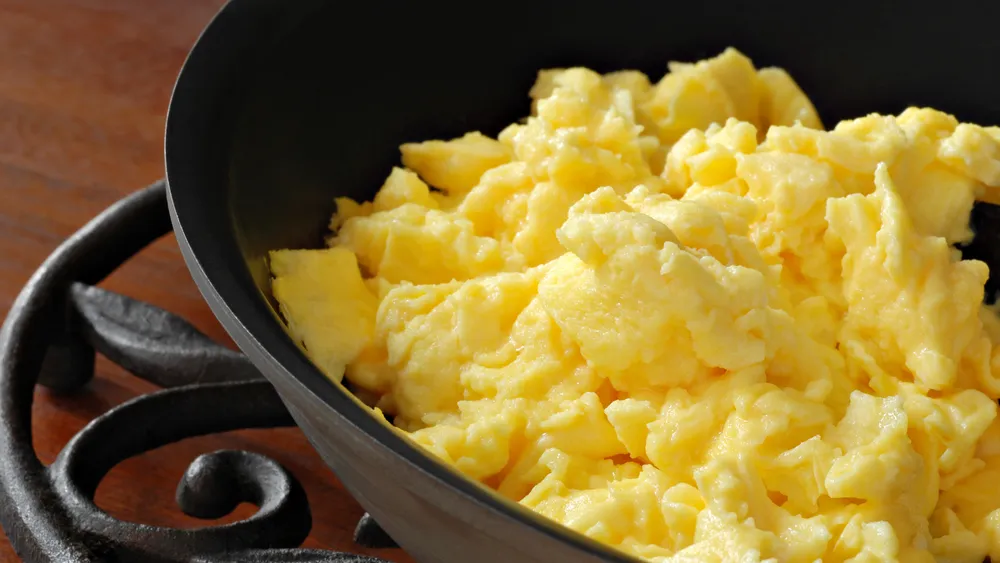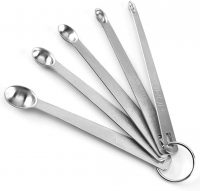You know how when you go to a diner or deli, the omelettes or scrambled eggs are all pretty and fluffy? How do they do that? Simple: By summoning demons, which I don’t recommend. Here’s a safer way to make fluffy eggs yourself.

- Ingredients:
- 4 large eggs
- 2 tsp. butter
- 2 tbsp. milk
- 1⁄8 tsp. baking powder
- Salt
- Pepper
- 1⁄2 cup grated cheddar cheese
I’ve never been concerned about presentation when I cook. It’s all gonna be eaten so why bother making it pretty? (I also apply this philosophy to making my bed, shaving and other wastes of time).
This is different, though. An omelette with fluffy eggs is not only prettier than your standard homemade omelette, but it also tastes better. This is all thanks to this secret ingredient: Baking powder.
ALERT! BAKING POWDER, NOT BAKING SODA!
We’re talking about baking powder, not baking soda. When I see a recipe call for baking powder, sometimes I still have to start over because I went on autopilot and used baking soda.
Here are the three most important rules about fluffy eggs:
- Start with room-temperature eggs.
- Whisk the bejabberz out of the eggs before cooking them, and
- Undercook them just a little. Details to follow.
Room temperature eggs:
Combine eggs, baking powder, salt, pepper, and milk.
Bejabberz:
Whisk them. A lot. Fast. How fast? Like you’re making whipped cream. Whisk ’em! Whisk ’em good! Whisk the bejabberz out of them. No, you may not use a mixer or blender, ya lazy bum.
The eggs will start to get frothy. Keep going.
When they’re frothy enough to suit you, let them sit at room temperature for 5 minutes.
In the meantime, get your skillet hot and buttery till the butter’s sizzling. (Don’t you love that nutty smell?)
Push the eggs around with a spatula or let ’em make a pancake if you’re making an omelette.
Undercook the eggs!
If you like your eggs a little runny, ignore this. If you don’t, undercook them a little bit anyway. They’ll coast on up to the correct doneness in a minute or two. If you cook them till they’re done, they’ll get rubbery or turn brown on the outside, neither of which is appetizing.
1⁄8 teaspoon of baking powder! WTF?
I see you noticed that too. If you need only 1⁄8 of a teaspoon for four eggs, that’s 1⁄32 teaspoon for each egg. How the heck do you measure something that small?
You could eyeball it; “just a pinch” or whatever. Keep in mind, though, that this isn’t seasoning. Too little baking powder and you’ll get unfluffy eggs; too much and you’ll have chalky eggs that taste like baking soda.
 I’m sure a lot of cooks can get away with eyeballing it. I’m not that confident, so I got some tiny measuring spoons, which come in 1⁄4 tsp, 1⁄8 tsp, 1⁄16 tsp, 1⁄32 tsp, ands 1⁄64 tsp. $8 on Amazon; check ’em out right here (this is not a paid or sponsored endorsement).
I’m sure a lot of cooks can get away with eyeballing it. I’m not that confident, so I got some tiny measuring spoons, which come in 1⁄4 tsp, 1⁄8 tsp, 1⁄16 tsp, 1⁄32 tsp, ands 1⁄64 tsp. $8 on Amazon; check ’em out right here (this is not a paid or sponsored endorsement).
